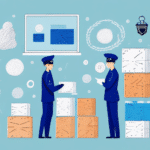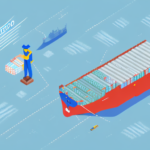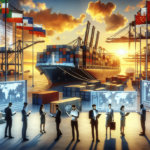Why Customs Valuation is Important for Supply Chain Management
Customs valuation is a fundamental component of global supply chain management, as it determines the monetary value of goods being imported or exported. This valuation is critical for calculating import duties and taxes, ensuring compliance with international trade regulations, and facilitating seamless cross-border logistics. According to the World Trade Organization (WTO), accurate customs valuation can significantly reduce supply chain disruptions and enhance overall efficiency.
Accurate valuation helps businesses avoid costly fines and penalties associated with non-compliance. In 2022 alone, non-compliance with customs regulations accounted for an estimated $2 billion in fines globally. Additionally, precise customs valuation enables companies to make informed pricing strategies, directly impacting profitability and market competitiveness.
Furthermore, customs valuation provides valuable insights into supply chain operations, allowing businesses to identify potential risks and opportunities. By analyzing valuation data, companies can optimize their processes, reduce costs, and enhance their strategic decision-making, ultimately leading to a more resilient and agile supply chain.
Essential Elements of Customs Valuation
Customs valuation encompasses several key elements that collectively determine the value of imported or exported goods:
- Transaction Value: The most common method, based on the price actually paid or payable for the goods when sold for export to the importing country.
- Identical or Similar Goods: Valuation based on the established value of identical or similar goods sold for export to the same country.
- Alternative Valuation Methods: Applied when transaction value is not available, including deductive value, computed value, and fallback methods.
- Country of Origin: Determines applicable tariff rates and trade agreements by assessing where the goods were produced, considering factors like materials used and processing levels.
Understanding these elements is crucial for businesses to ensure accurate valuation and compliance. For detailed guidelines, refer to the World Customs Organization (WCO).
How Customs Valuation Affects Import Taxes and Duties
The customs value of imported goods serves as the foundation for calculating import taxes and duties, which can substantially influence overall supply chain costs. According to recent data, customs duties can account for up to 20% of the total landed cost of goods, depending on the product category and country of origin.
Accurate valuation is imperative to ensure compliance with tax and duty requirements, thereby avoiding penalties and delays. Discrepancies in valuation methods or errors in calculation can lead to disputes with customs authorities, resulting in financial losses and operational setbacks. Engaging with a certified customs broker or professional can mitigate these risks by providing expert guidance through the complex valuation process.
Common Methods of Customs Valuation
Several methods are employed to determine customs value, each suitable for different transaction scenarios:
- Transaction Value: Based on the actual price paid for the goods, including adjustments for transportation, insurance, and licensing fees.
- Value of Identical Goods: Uses the price of identical goods sold for export to the same country.
- Value of Similar Goods: Based on similar goods with minor differences, such as quality or reputation.
- Deductive Value: Derived from the sale price of the goods in the importing country, minus certain costs like marketing and transportation.
Choosing the appropriate valuation method requires a comprehensive understanding of the transaction details and availability of comparable data. The World Trade Organization provides extensive guidelines to assist businesses in selecting the most suitable method.
The Role of the World Trade Organization in Customs Valuation
The World Trade Organization (WTO) plays a pivotal role in establishing standardized customs valuation practices through the Agreement on Implementation of Article VII of the General Agreement on Tariffs and Trade (GATT) 1994. This agreement aims to ensure fair, transparent, and consistent valuation methods across member countries, thereby facilitating smooth international trade.
The WTO's guidelines help prevent arbitrary or discriminatory customs practices that can create trade barriers and hinder economic growth. By promoting standardized valuation, the WTO ensures a level playing field for businesses globally, enhancing trust and reliability in international transactions.
Best Practices for Complying with Customs Valuation Regulations
Compliance with customs valuation regulations is essential to avoid legal and financial repercussions. Implementing best practices can streamline this process:
- Maintain Accurate Records: Detailed documentation of all transactions, including invoices, shipping documents, and contracts.
- Obtain Comparable Data: Use reliable sources to find comparable goods for accurate valuation methods.
- Establish Internal Controls: Develop standardized procedures and conduct regular audits to ensure consistency and accuracy.
- Stay Informed: Keep abreast of changes in customs regulations and international trade agreements.
- Collaborate with Experts: Partner with customs brokers or consultants to navigate complex valuation scenarios effectively.
Adhering to these practices not only ensures compliance but also optimizes supply chain efficiency. For more guidance, visit ShipScience's resource center.
How to Ensure Accurate Declaration of Goods and Values
Accurate declaration of goods and their values is crucial for smooth customs clearance. To achieve this:
- Maintain Up-to-Date Product Information: Keep detailed records of product descriptions, specifications, and country of origin.
- Use Reliable Valuation Methods: Apply the appropriate valuation method based on the transaction details and available data.
- Comply with Regulatory Requirements: Understand and adhere to the specific customs regulations of the importing country.
- Implement Verification Processes: Regularly audit declarations to ensure accuracy and consistency.
Non-compliance can result in delays, fines, or legal actions, which can disrupt supply chain operations. Utilizing tools and platforms like ShipScience can help streamline the declaration process and enhance accuracy.
Common Challenges Faced in Customs Valuation and How to Overcome Them
Businesses often encounter several challenges in customs valuation, including:
- Inconsistent Valuation Methods: Variations in applying valuation methods can lead to discrepancies. Establishing standardized internal procedures can mitigate this issue.
- Incomplete Documentation: Missing or inaccurate documentation can cause delays and penalties. Implementing robust record-keeping systems ensures complete and accurate records.
- Inaccurate Classification of Goods: Misclassification can affect duty rates and compliance. Regular training and consultation with customs experts can enhance classification accuracy.
- Lack of Transparency: Unclear valuation processes can lead to disputes. Adopting transparent and internationally recognized valuation methods fosters trust and reduces conflicts.
- Transfer Pricing Issues: Related parties setting non-market prices can distort valuations. Implementing compliant transfer pricing policies and thorough documentation can address this challenge.
Overcoming these challenges requires a combination of effective processes, continuous education, and collaboration with customs authorities. Leveraging technology solutions from platforms like ShipScience can also enhance transparency and accuracy in customs valuation.
The Benefits of Effective Customs Valuation for Supply Chain Management
Implementing effective customs valuation practices offers numerous advantages for supply chain management:
- Increased Efficiency: Streamlined customs processes reduce delays and enhance the speed of goods movement across borders.
- Cost Reduction: Accurate valuation minimizes overpayment of duties and taxes, optimizing overall supply chain costs.
- Improved Compliance: Adhering to customs regulations prevents penalties and fosters a positive relationship with customs authorities.
- Enhanced Risk Management: Identifying and mitigating valuation-related risks ensures a more resilient supply chain.
- Better Strategic Decision-Making: Insights from valuation data inform pricing, sourcing, and logistics strategies.
By mastering customs valuation, businesses can achieve greater control over their supply chains, leading to improved customer satisfaction and increased competitiveness in the global market.
Case Studies: Successful Implementation of Effective Customs Valuation Strategies
Examining real-world examples highlights the impact of effective customs valuation strategies:
Case Study 1: A multinational electronics company faced frequent customs valuation discrepancies across different regions, resulting in substantial fines and shipment delays. By implementing a centralized valuation system and conducting regular training for their customs teams, the company reduced valuation errors by 40% within the first year, leading to significant cost savings and improved compliance.
Case Study 2: A mid-sized apparel manufacturer struggled with inaccurate declarations, causing extended customs holds and increased operational costs. Partnering with a specialized customs broker and utilizing advanced software solutions streamlined their declaration process, achieving a 25% reduction in clearance times and enhancing overall supply chain efficiency.
These case studies underscore the importance of robust valuation practices, accurate documentation, and strategic partnerships in achieving successful supply chain outcomes.
Future Trends in Customs Valuation for Supply Chain Management
The landscape of customs valuation is evolving, driven by technological advancements and changing global trade dynamics. Key future trends include:
- Integration of Blockchain Technology: Blockchain offers enhanced transparency and traceability in customs valuation, reducing fraud and ensuring data integrity.
- Artificial Intelligence and Machine Learning: AI-driven tools can analyze vast datasets to improve valuation accuracy and predict potential compliance issues.
- Emphasis on Sustainability and Ethical Practices: Growing consumer demand for sustainable and ethically sourced products necessitates transparent supply chains, influencing customs valuation processes.
- Increased Focus on Resilience and Agility: The COVID-19 pandemic highlighted the need for adaptable supply chains. Future customs valuation practices will prioritize risk management and contingency planning to handle disruptions effectively.
- Enhanced Regulatory Harmonization: Ongoing efforts to harmonize customs regulations across countries will simplify valuation procedures and facilitate smoother international trade.
Businesses that embrace these trends by adopting advanced technologies and sustainable practices will be better positioned to navigate the complexities of global supply chains and maintain a competitive edge.
In conclusion, a comprehensive understanding of customs valuation is essential for effective supply chain management. By implementing best practices, leveraging technology, and staying informed about regulatory changes, companies can optimize their operations, reduce costs, and achieve greater compliance and efficiency in their global trade activities.




















